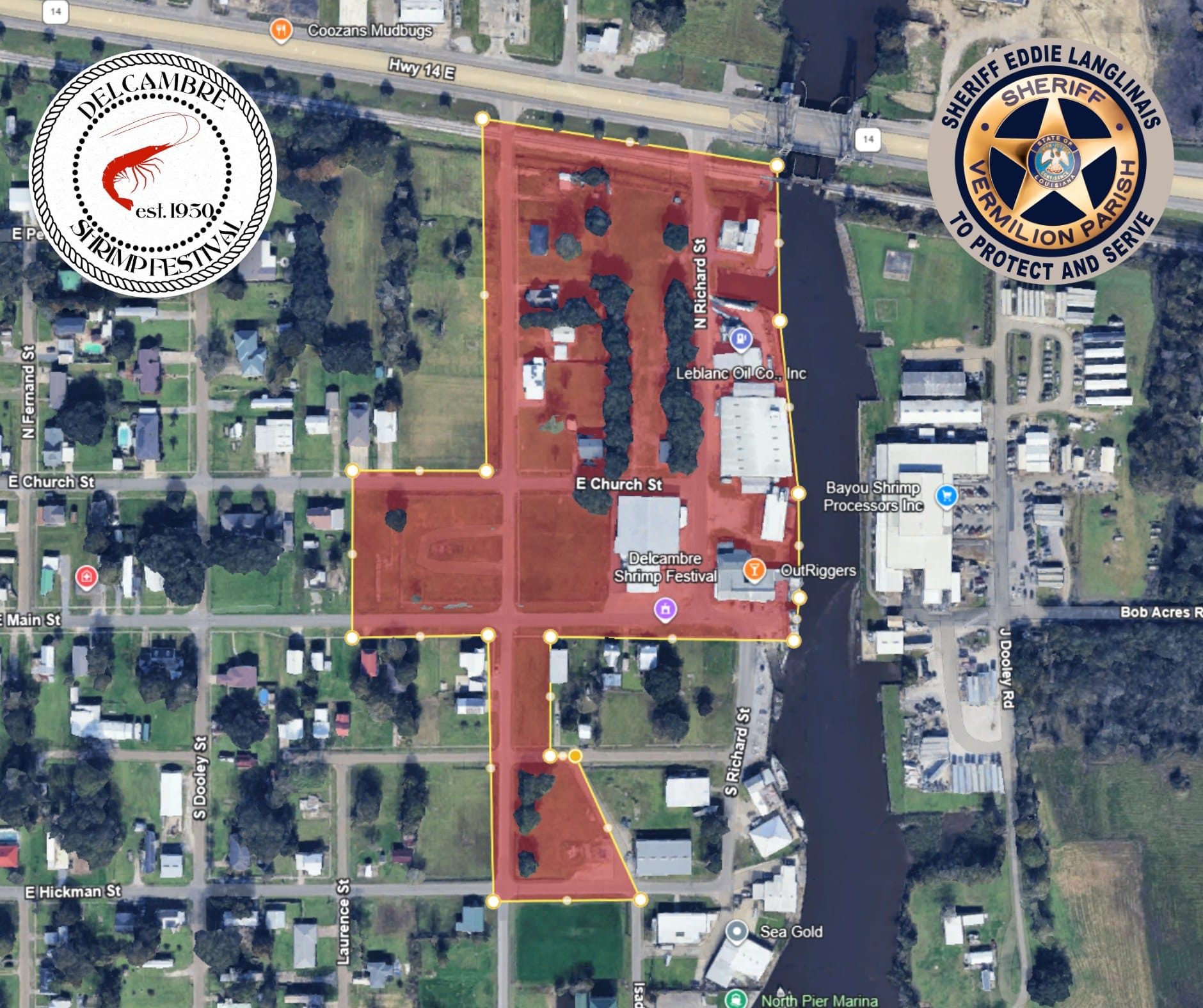The Vermilion Parish Sheriff’s Office announced that an area along the Delcambre Shrimp Festival parade route had been designated a “Drone No Fly Zone” for the duration of the festival. In a Facebook post, Sheriff Eddie Langlinais cited Louisiana’s new “We Will Act” law, which restricts drone flights over public gatherings without prior authorization and requires local authorities to post restricted-area notices. The post warned that violations could result in fines of $2,000 to $5,000, up to one year in prison, and confiscation of the drone.
FAA records show no active Temporary Flight Restrictions (TFR) or Notices to Air Missions (NOTAMS) for the Delcambre area on the date of the festival, meaning the “Drone No Fly Zone” existed under Louisiana’s We Will Act law, not under federal airspace restrictions.
The “We Will Act” law does more than create a misdemeanor for flying a drone over a parade without permission. It folds in a powerful definition of “mitigation measures” — everything from jamming to physical capture — and hands that toolkit to local law enforcement. The penalties are steep: $2,000 to $5,000 in fines, up to a year in jail, and mandatory forfeiture of the drone. The law even removes ignorance as a defense, requiring “Drone No Fly Zone” signs but holding operators accountable regardless of whether they saw them.
“The ‘We Will Act’ Act enacted strict drone regulations which restrict the flying of unmanned aircraft…” Sheriff Eddie Langlinais told residents in a Facebook post announcing his first enforcement zone.
On paper, Louisiana’s parade ban sits inside a much larger airspace system the FAA already governs. Under Part 107 of the federal rules, some drones are explicitly allowed to fly over people or moving vehicles without a waiver. FAA-approved operations — from Category 1 under-250g drones to Category 4 airworthiness-certified craft — could still be grounded by Act 170’s blanket prohibition.
The law assumes Louisiana controls that airspace — but the FAA might think otherwise.
Louisiana has been regulating drones for nearly a decade. In 2016, Act 268 authorized police to disable drones flying into crime scene cordons. That same year, Act 545 created agricultural licensing and training requirements for commercial operators, and Act 635 folded UAS into voyeurism and “Peeping Tom” statutes. In 2017, Act 317 claimed exclusive state control over drone regulation and recognized that federal preemption could nullify state provisions.
If Louisiana is first, it’s first to test how far a state can push into federal airspace.
When Langlinais took office in 2024, he made it clear technology would define his tenure. “We’re going to be utilizing technology, such as cameras, license plate readers, throughout the parish. It helps investigators to stop crime quicker,” he said at his swearing-in. His Facebook posts rolled out “Drone No Fly Zone” maps for major events, complete with warnings about Act 170’s penalties.
“It allows us to track vehicles or find out what vehicles passed in certain areas… to maybe prevent other crimes from happening,” Langlinais said.
In Jefferson Parish, LPR data sharing raised questions about who could see sensitive movement logs. In Oakland, public outcry over a real-time crime center led to a privacy ordinance and an oversight board. New Orleans briefly banned certain surveillance tools over bias concerns. Green Bay’s LPR network was hacked, exposing location data online. Fairfax County faced a lawsuit over storing LPR scans for a year on innocent drivers.

In other cities, this tech launched with applause — and ended up in court.
Langlinais’s openness to “training” requirements for permitless carry puts him on a collision course with the Supreme Court’s Bruen decision and the Firearms Policy Coalition’s litigation track record. FPC has already dismantled training mandates and broad carry restrictions in federal court. The constitutional guardrails are clear: modern regulations must fit within historical tradition, or they fall.
A policy that may sound reasonable to the public in Abbeville can fall apart in federal court.
If Vermilion Parish enforces Act 170 against a drone operator flying with FAA authorization, the legal clash could cost the county. Field preemption gives the FAA exclusive control of airspace use, and conflict preemption blocks state laws that frustrate federally approved operations. The law’s jamming provisions could also land local agencies in trouble with the FCC, which regulates the radio spectrum. Add to that the absence of formal oversight for the parish’s expanding camera and license plate reader network, and the risks multiply.
Louisiana’s “We Will Act” law is a bold assertion of state and local authority. In Vermilion Parish, it’s paired with a sheriff eager to wrap it into a wider surveillance strategy — one that reaches from the airspace above a parade route to every entry road into the parish. But bold laws don’t live in isolation; they face the courts, and the courts have been clear about the limits of both state airspace control and firearms regulation.
Sources & References
- Louisiana Act 170 (2025) — “We Will Act” Act
https://www.legis.la.gov/Legis/ViewDocument.aspx?d=1425158 - FAA Part 107 — Operations Over People
https://www.faa.gov/uas/commercial_operators/operations_over_people - FAA Part 107 — Operations From a Moving Vehicle
https://www.faa.gov/uas/commercial_operators/part_107_waivers - FAA Accepted Means of Compliance (Categories 2 & 3) — Federal Register, April 5, 2024
https://www.federalregister.gov/documents/2024/04/05/2024-07266/accepted-means-of-compliance-for-small-unmanned-aircraft-category-2-and-category-3-operations-over - N.Y. State Rifle & Pistol Ass’n v. Bruen, 142 S. Ct. 2111 (2022)
https://www.supremecourt.gov/opinions/21pdf/20-843_7j80.pdf - Lara v. Evanchick (FPC litigation)
https://www.firearmspolicy.org/fpc-victory-in-lara-v-evanchick - Oakland Tactical Supply, LLC v. Howell Township (FPC-supported challenge)
https://www.firearmspolicy.org/fpc-supported-shooting-range-training-ban-lawsuit-seeks-supreme-court-review - Antonyuk v. Hochul (Ongoing FPC litigation)
https://www.firearmspolicy.org/litigation





